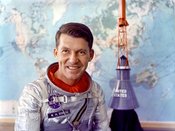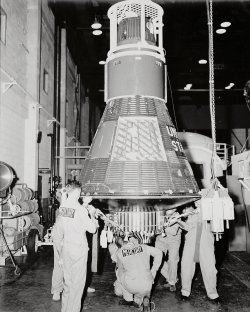Mercury 8
|
|
| Mission Insignia | |
|---|---|
| Missing image Sigma_7_insignia.jpg Mercury 8 insignia | |
| Mission Statistics | |
| Mission Name: | Mercury MA-8 |
| Call Sign: | Sigma 7 |
| Number of Crew Members: | 1 |
| Launch: | October 3, 1962 12:15:11 UTC Cape Canaveral Complex 14 |
| Landing: | October 3, 1962 21:28:22 UTC 32° 7' 30"N - 174° 45' W 440 km NE Midway Is. Pacific |
| Duration: | 9 hours 13 min 11 s |
| Number of Orbits: | 6 |
| Distance Traveled: | 143,983 mi 231,718 km |
| Maximum velocity: | 17,558 mph 28,257 km/h |
| Peak acceleration: | 8.1 g (79 m/s²) |
| Mass: | 1,370 kg |
| Crew Picture | |
| Wally Schirra | |
| Contents |
Crew
- Wally Schirra (flew on Mercury 8, Gemini 6A, & Apollo 7)
Backup Crew
Mission Parameters
- Mass:1370 kg
- Perigee: 153 km
- Apogee: 285 km
- Inclination: 32.5°
- Period: 89 min
See also
Mission Highlights
Mercury 8 was a Mercury program manned space mission launched on October 3, 1962. The capsule was named "Sigma 7" and completed six earth orbits piloted by astronaut Wally Schirra. It was the first flawless Mercury mission.
Schirra's was the first of two longer-duration Mercury missions. After Carpenter's flawed reentry, the emphasis returned to engineering rather than science (Schirra even named his spacecraft "Sigma" for the engineering symbol meaning "summation.") The six-orbit mission lasted nine hours and l3 minutes, much of which Schirra spent in what he called "chimp configuration," a free drift that tested the Mercury's autopilot system. Schirra also tried "steering" by the stars (he found this difficult), took photographs with a Hasselblad camera, exercised with a bungeecord device, saw lightning in the atmosphere, broadcast the first live message from an American spacecraft to radio and TV listeners below, and made the first splashdown in the Pacific. This was the highest flight of the Mercury program, with an apogee of 283.24 kilometers, but Schirra later claimed to be unimpressed with space scenery as compared to the view from high-flying aircraft. "Same old deal, nothing new," he told debriefers after the flight. Sigma 7 landed near the international date line in the Pacific Ocean, 275 miles (440 km) NE of Midway Island. The landing coordinates were near 32° 7' 30" N - 174° 45' W according to a chart in NASA publication SP-12 "Results of the Third U.S. Manned Orbital Space Flight, October 3, 1962" .
Mercury spacecraft # 16 - Sigma 7, used in the Mercury-Atlas 8 mission, is currently displayed at the United States Astronaut Hall of Fame, Titusville, FL . Mercury spacecraft #16 Sigma 7 display page on A Field Guide to American Spacecraft website. (http://aesp.nasa.okstate.edu/fieldguide/pages/mercury/ma-8.html)


